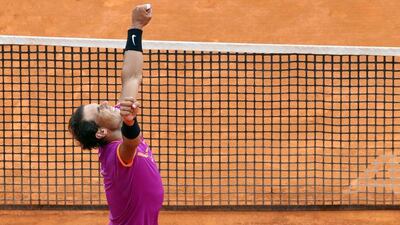Defending champion Rafael Nadal easily beat Albert Ramos-Vinolas 6-1 6-3 in an all-Spanish final on Sunday to win the Monte Carlo Masters for the 10th time and clinch the 70th title of his career.
It was Nadal’s first title of the season, having lost his previous three finals — two of those to Roger Federer.
Nadal faced little opposition on his way to becoming the first player to win 10 tournaments at the same venue in the Open era, and the first to reach 50 on clay. He was previously level on clay titles with Argentine Guillermo Vilas.
“When I came here for the first time (in 2003) I reached the third round after coming through the qualifiers,” Nadal said. “Ten titles is something I never dreamed of. See you next year.”
The only final the 30-year-old Nadal has lost at Monte Carlo was to Novak Djokovic in 2013.
Ramos-Vinolas never looked like posing a threat.
Appearing in his first Masters final, the 15th-seeded Ramos-Vinolas saved three break points in his first service game and was 0-40 down in his next. Nadal served out the set in 30 minutes with an ace.
Nadal’s 29th Masters title moves him one behind Djokovic’s record. He will also have his sights set on a 10th title in Barcelona next week — Nadal’s previous career title was there, almost one year ago.
Since then, Federer has beaten him in finals at the Australian Open and the Miami Masters, either side of a win for big-serving American Sam Querrey at Acapulco, Mexico. Federer also beat Nadal in the fourth round at Indian Wells, but the 18-time Grand Slam champion skipped Monte Carlo this year.
Ramos-Vinolas had lost his two previous matches to Nadal in straight sets — both in Barcelona. He competed better in the third set, holding to love in the seventh game to provoke sympathetic applause, but a second career title never looked realistic.
Ramos-Vinolas saved two match points after matching Nadal’s aggression, but a poor unforced error gave Nadal a third match point and Ramos-Vinolas double-faulted to lose in 1 hour, 16 minutes of a one-sided contest.
Nadal’s celebrations were somewhat muted, and he gave Ramos-Vinolas a sympathetic pat on the back. Nadal tilted his head back and put both hands on his head as his achievement began to sink in, while his opponent buried his head into a towel.
He never really stood a chance against the player widely considered the greatest ever on clay.
Nadal’s 70 titles are three better than Djokovic, who is a year younger. Nadal is fifth on the all-time list, but seven behind John McEnroe. Further ahead, the 35-year-old Federer has 91; Ivan Lendl 94 and Jimmy Connors is a long way away with 109.
Nadal watched smiling as each of his Monte Carlo trophy presentations over the years was played on the big screen.
The first photo, of him raising the trophy in 2005 as a distinctly shy 18-year-old who was taking tennis by storm, made Nadal laugh.
There was nothing amusing for his opponents.
He won every year after that — including the next three finals against Federer, who could never crack him on clay. Djokovic did, in the 2013 final. Stan Wawrinka won in 2014 and Djokovic again in 2015, comfortably beating Nadal in the semis.
Nadal looked emotional when the Spanish national anthem was played.
His first appearance in Monte Carlo was as a 16-year-old in 2003, when he beat Slovak Karol Kucera in the first round. That win was impressive enough, but he then stunned the tennis world by knocking out defending French Open champion Albert Costa in a second-round match that finished as night was falling.
It was the start of Nadal’s stellar career on clay.
He will be among the favourites at the French Open this year, which was the last of his 14 Grand Slam wins in 2014.
Nadal will be hunting for a 10th title at Roland Garros, too.
* Associated Press
Follow us on Twitter @NatSportUAE
Like us on Facebook at facebook.com/TheNationalSport

